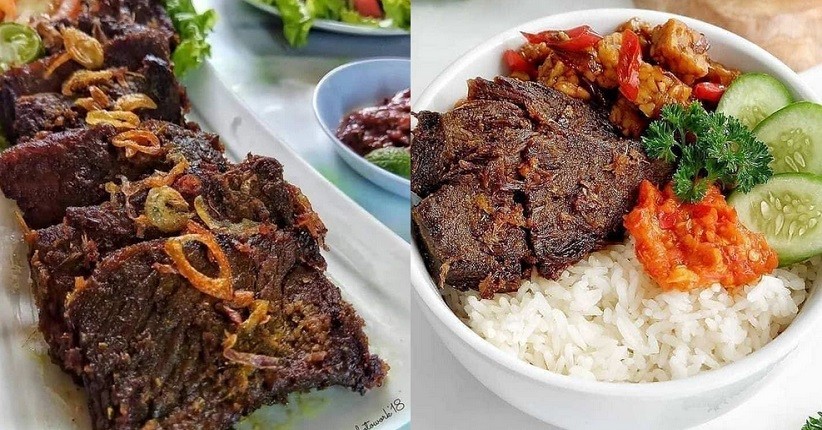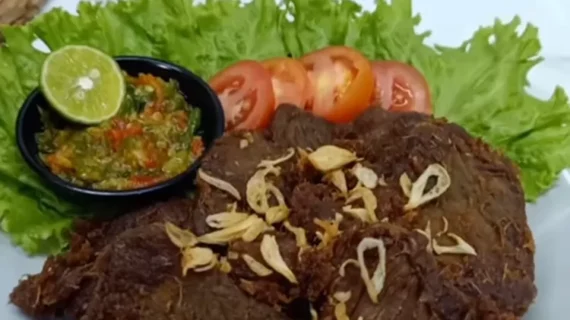Introduction to Gepuk Sapi and Sambal Dadak
Gepuk Sapi, also known as Empal Gepuk, is a traditional dish from West Java that has captivated the palates of locals and visitors alike. This dish features tender slices of beef that are first boiled, then pounded flat, and finally fried until golden brown. The result is a dish that combines the richness of slow-cooked meat with the aromatic depth of a complex spice blend. Alongside Gepuk Sapi, Sambal Dadak, a fresh and zesty chili paste, plays an essential role in enhancing the flavors of this beloved Sunda dish.
The combination of Gepuk Sapi and Sambal Dadak is not just about taste; it’s a cultural experience rooted in the traditions of West Java. From the preparation of the meat to the making of the sambal, every step reflects the care and craftsmanship of the local culinary heritage.
The Art of Making Gepuk Sapi
To prepare Gepuk Sapi, you’ll need 500 grams of beef (preferably the outer part for a softer texture). Start by boiling the meat in water until it becomes tender. Once cooked, allow the meat to cool slightly before slicing it against the grain. Using a mortar and pestle or a dedicated meat mallet, gently pound the slices to flatten them out. This process helps the meat absorb more flavor during the cooking stage.
Next, create a rich sauce by combining the following ingredients:
– 4 cm of grated galangal
– 2 pieces of bay leaves
– 2 tablespoons of sweet soy sauce
– 1 tablespoon of palm sugar
– ½ teaspoon of tamarind
– 500 ml of coconut milk
– 1 tablespoon of chicken powder
– 7 cloves of garlic
– 5 cloves of shallots
– 1 tablespoon of toasted cumin
– 3 cloves of cloves
– 2 teaspoons of salt
Once all the ingredients are ready, combine the sliced meat with the ground spices in a wok. Add the remaining broth from the boiling process, along with the other seasonings. Cook the mixture over medium heat until the liquid reduces and the flavors meld together. Finally, fry the meat in a pan over low heat until it turns a golden color.
The Essence of Sambal Dadak

Sambal Dadak is a vibrant and fresh chili paste that complements Gepuk Sapi perfectly. To make this spicy condiment, you’ll need:
– 20 red bird’s eye chilies
– 20 green bird’s eye chilies
– 4 small tomatoes
– 2 limes
– ½ teaspoon of burnt shrimp paste
– Salt and sugar to taste
– A pinch of chicken powder
Start by washing and draining the chilies and tomatoes. Then, use a mortar and pestle to grind the chilies into a smooth paste. Add the chopped tomatoes to help achieve a finer consistency. Mix in the burnt shrimp paste, followed by salt, sugar, and chicken powder. Finish by squeezing the juice of the limes to add a refreshing tang.
Cultural Significance and Serving Suggestions

Gepuk Sapi is traditionally served with a variety of side dishes, including steamed rice, pickled vegetables, and a sour vegetable soup. The addition of Sambal Dadak elevates the meal, offering a burst of heat and freshness that balances the richness of the meat. In many households, especially in West Java, Gepuk Sapi is a staple during gatherings and special occasions, symbolizing hospitality and community.
The dish is also commonly found in local eateries, where it is often paired with other traditional Sunda dishes. One such establishment is RM Ibu Ubed in Bogor, a popular spot known for its authentic Sunda cuisine. The restaurant’s signature dish, Ayam Bakar (grilled chicken), is another example of how Sunda cuisine emphasizes the use of bold flavors and traditional cooking techniques.
Tips for Perfecting Your Gepuk Sapi

While the recipe provides a solid foundation, there are a few tips to ensure your Gepuk Sapi turns out perfectly:
– Use high-quality beef for the best results.
– Avoid overcooking the meat during the initial boiling stage to maintain its tenderness.
– When pounding the meat, be gentle to prevent it from becoming too thin.
– Fry the meat at a low temperature to avoid burning and ensure even browning.
By following these steps, you can recreate the authentic flavors of Gepuk Sapi in your own kitchen.
Conclusion
Gepuk Sapi and Sambal Dadak are more than just dishes; they are a celebration of Sunda’s rich culinary heritage. From the careful preparation of the meat to the vibrant, homemade sambal, every element of this meal tells a story of tradition, flavor, and community. Whether enjoyed at a local eatery or prepared at home, Gepuk Sapi remains a beloved favorite that continues to bring people together through the joy of food.






